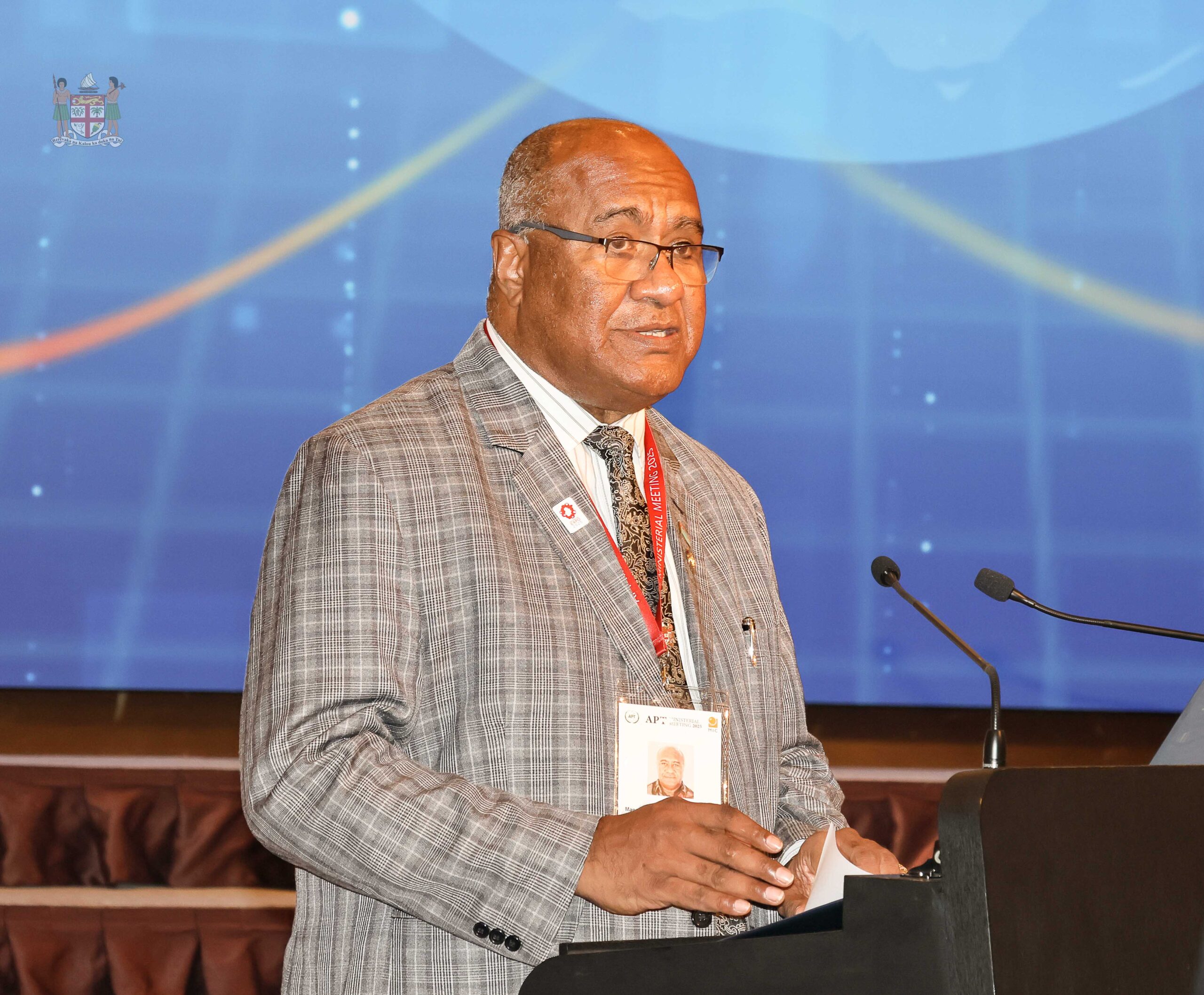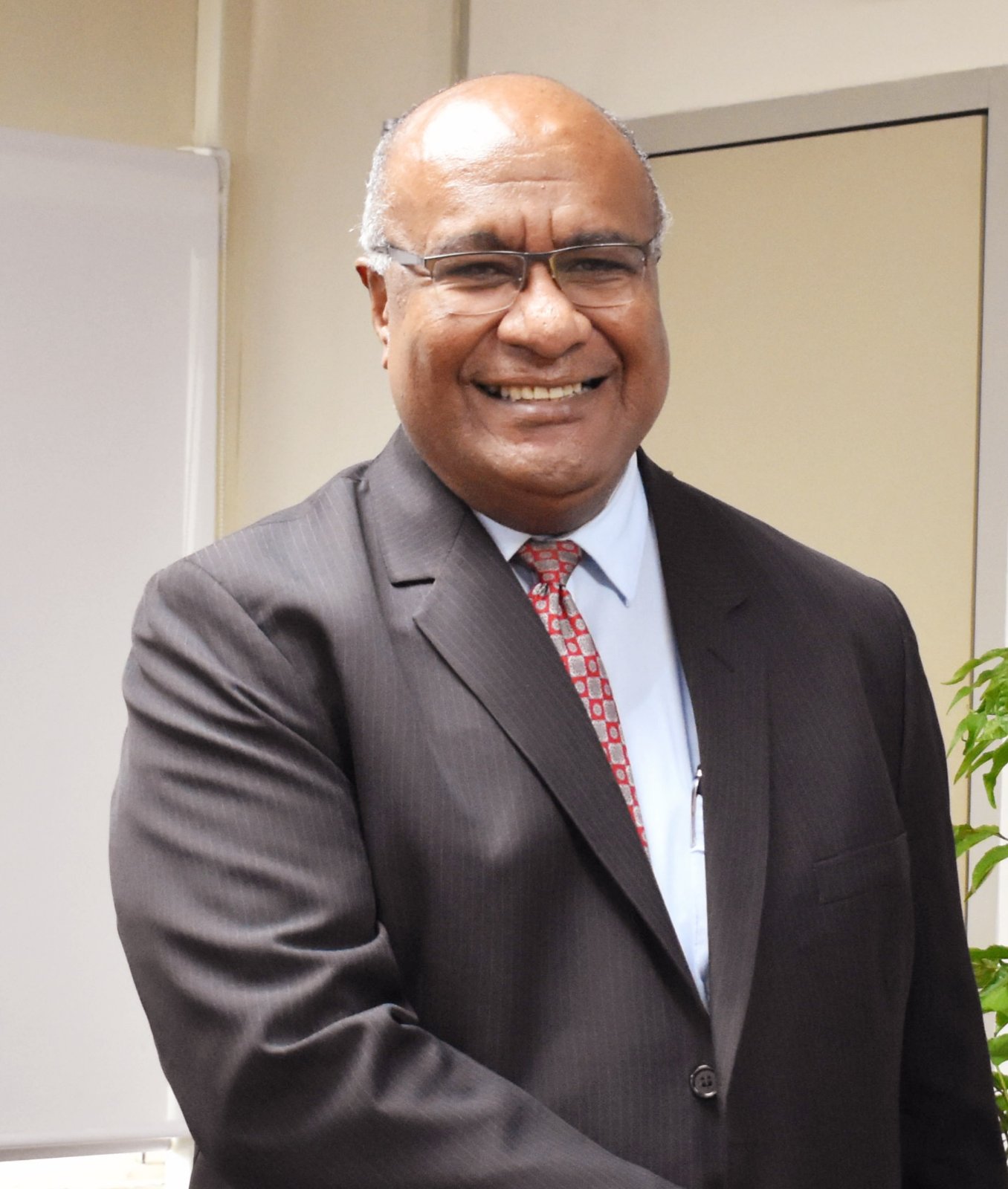Thank you to the Ministerial Moderator ,H.E. Dr. Seyed Sattar Hashemi,( Minister, Ministry of Information and Communication Technology, Iran)
Bula Vinaka and a very good afternoon Honourable Ministers, Heads of Delegation, distinguished delegates and everyone in attendance.
It is an honour to address this esteemed APT Ministerial Meeting, especially on a panel discussing Sustainable Digital Infrastructure and Accessibility.For many of us from the Pacific Island nations, this discussion carries a profound significance. While larger economies may focus on scaling existing robust networks, our reality is often defined by vast distances, scattered populations, unique geographical challenges, and the immediate need to bridge significant digital divides. We do not just build infrastructure; we build sustainable lifelines that connect communities, empower livelihoods, and ensure no one is left behind in the digital age.
Fiji’s commitment to this vision is encapsulated in our recently launched National Digital Strategy 2025–2030. This strategy is our national digital compass, charting a course toward a digitally empowered society and a modern economy built on inclusion, resilience, and secure nationwide digital transformation, directly addressing the need for both sustainable infrastructure and universal accessibility.
We are actively investing in resilient digital infrastructure and proactively exploring partnerships for foreign investment as Fiji develops as a ICT hub. A prime example of this impactful approach is the Google subsea cable investment, which once completed will extend high-capacity internet connections not only to Fiji but also across the wider Pacific region. This strategic engagement, crucial for future-proofing our digital backbone, underlines the increased confidence global companies have in Fiji and the broader Pacific. This will contribute significantly to Fiji’s goal of diversifying the economy, fostering a more digital economy, and cementing Fiji’s role as a vital hub of connectivity in the region. This project alone is projected to create over 3,600 new jobs and contribute an estimated US$250 million to Fiji’s GDP by 2030. Furthermore, the official commencement of Starlink services in Fiji marked another significant milestone, empowering our remote, maritime, and underserved communities with high-speed internet connectivity. This LEO satellite technology offers remarkable resilience during emergencies, as demonstrated when it reconnected our neighbours in Tonga after the 2022 volcanic eruption. While satellite connectivity is not a panacea, it plays a pivotal role in reaching our most remote areas, enhancing accessibility.
Just this May, we also launched a Fiber Optic Link on our second largest island, Vanua Levu, a milestone project that provides a reliable, high-capacity fibre backbone, directly connecting the biggest town in Fiji’s North via the domestic submarine cable landing station.
We are also on the verge of rolling out 5G in Fiji, which will heavily rely on a strong fiber backbone. We have taken our time to ensure that we have the optimal spectrum and networking resources planned. This will ensure that deployment of 5G in Fiji is technically sound, economically rational and socially inclusive thus being impactful for our people. All these activities focused on the infrastructure will significantly enhance network reliability and capacity, underpinning Fiji’s economic expansion policy and ensuring that even our most remote communities can access the opportunities digital connectivity brings.
Our efforts extend beyond physical infrastructure to ensure pervasive accessibility. Through initiatives like the Smart Islands Programme, in partnership with the International Telecommunication Union, we are bringing digital empowerment directly to our islands. The launch of the Smart Classroom at a High School, located on the remote island of Rotuma, for example, provides 171 young minds with cutting-edge digital tools, breaking down geographical barriers to education and offering a community Wi-Fi hotspot through Starlink. This project is a microcosm of our national journey, ensuring that digital access is universal, secure, meaningful, and transformative for every Fijian.
Fiji is also actively focusing on cybersecurity as a key element of sustainable digital development. It is not just an add-on; it’s a fundamental pillar. We are bolstering our cyber resilience and digital governance frameworks. Fiji has completed its second National Cybersecurity Maturity Model Assessment, which is guiding the development of our National Cybersecurity Strategy and the operationalisation of our National Computer Emergency Response Team (CERT). Our recent endorsement of signing the Second Additional Protocol to the Budapest Convention and the UN Convention Against Cybercrime further demonstrates our commitment to enhancing criminal justice capabilities and widening our cooperation network in addressing cyber offences, thereby contributing to a more secure and sustainable digital environment.
As a Pacific Island nation, Fiji envisions a future where digital technologies are not just tools, but catalysts for innovation that enhance the quality of life for all our people and foster sustainable growth. We strive for a world where connectivity bridges divides, where businesses flourish through technology, and where digital services are accessible and efficient for everyone. By continuing to invest in resilient digital infrastructure and embracing a forward-thinking mindset, Fiji is looking to position itself as an emerging leader in the digital economy, capable of contributing to the prosperity of the entire region and beyond. This ambitious transformation demands a collaborative, whole-of-society approach, underpinned by active partnerships with all stakeholders – including our pioneering nations in the Asia-Pacific region and international partners and the private sector– to build a truly inclusive and connected global digital landscape.
I look forward to continued collaboration with our regional and international partners here at the APT Ministerial meeting and beyond, ensuring a more connected, inclusive, and prosperous Asia-Pacific.
Vinaka vakalevu.



